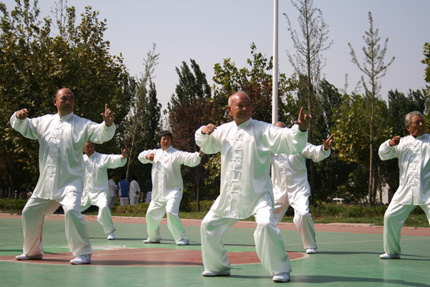Qigong moves qi inside and out
The ancient practice of qigong is more than a martial art - it's a healing system that harmonizes the life force qi with the body and mind.
 |
|
A group of elderly people practice qigong at a local park. |
This is a common image of qigong (life force skill) depicted in kung fu fiction and movies. It's one of the Chinese martial arts that both helps defend and attack by using yun qi (moving the energy inside).
There are various types of qigong, not only martial arts practice but also health maintenance and healing; it is also used in meditation. Qi is sometimes defined as breath or air and qigong involves careful breathing coordinated with well as physical movements.
Traditional Chinese medicine holds that systematic medical qigong contributes to harmony and coordination among body, mind and qi, thus providing sufficient healthy qi.
It is defined as a system of energy cultivation, a system of prescribed physical exercises or motions performed in a meditative state in which the mind is clear.
Regulating breath, mind and body to guide qi is traced back to the time of the Yao emperor (around 2300 BC). Ancient records cite the use of qigong to increase longevity.
Qigong practices have been used in various healing schools over the years, according to Professor Liu Tianjun with the Acupuncture School of the Beijing University of Chinese Medicine. He discussed qigong health maintenance at the Shanghai Sun Island Health forum earlier this month.
Guiding qi is known as nei dan (internal alchemy) in Taoism; zuo chan (sit in meditation) in Buddhism; zuo wang (sit in oblivion) in Confucianism; dao yin (energy guiding) in TCM and kung fu in martial arts.
All involve moving energy within the body, but in religion (Taoism, Confucianism and Buddhism) the aim is to prolong life, in martial arts the aim is to defend and attack while in TCM the objective is health maintenance.
A healthy flow of qi is the basis of good health. Internal qi should also be balanced and exchanged with external qi that is all around in the universe. "Body, mind and qi are the three major elements of human life," says Zhang Wenchun, a doctor at the Jiangxi TCM Academy. "When they are in harmony and merged with each other, the body is at its best."
But it's not easy to achieve a state of balance, especially in modern society where several tasks must be performed quickly and almost at the same time.
"We are always doing one thing while thinking of another; our mind and body don't work as one, let alone merging together with qi," says Dr Zhang. "And when the three are not in harmony as one, we are consuming the energy rather than recharging, which is bad for health."
Though qi is an energy that cannot be seen or touched, it can be guided with body movement and thought as qi both fills and surrounds each part of the body, practitioners say.
Emptying the mind and focusing of nothing except physical movement and energy flow is essential and this can help a person feel and guide the flow of qi - something people are seldom conscious of in daily life.
Body movements are usually slow and gentle since the aim is not strengthening or building muscle but guiding energy flow. Body movements, such as those of the arms and hands, can also move the qi surrounding the body.
Breath regulation is essential and usually deep, even and quiet breathing is recommended, though particular movements may require inhaling or exhaling. Breathing exercise improves blood circulation and cardiovascular efficiency, meaning the body gets more oxygen with less energy consumption.
Few movements are difficult. Even the simplest such as zhan zhuang (standing on a post), ma bu (horse stance) or sitting quietly can be helpful if practiced properly.
 0
0 







Go to Forum >>0 Comments